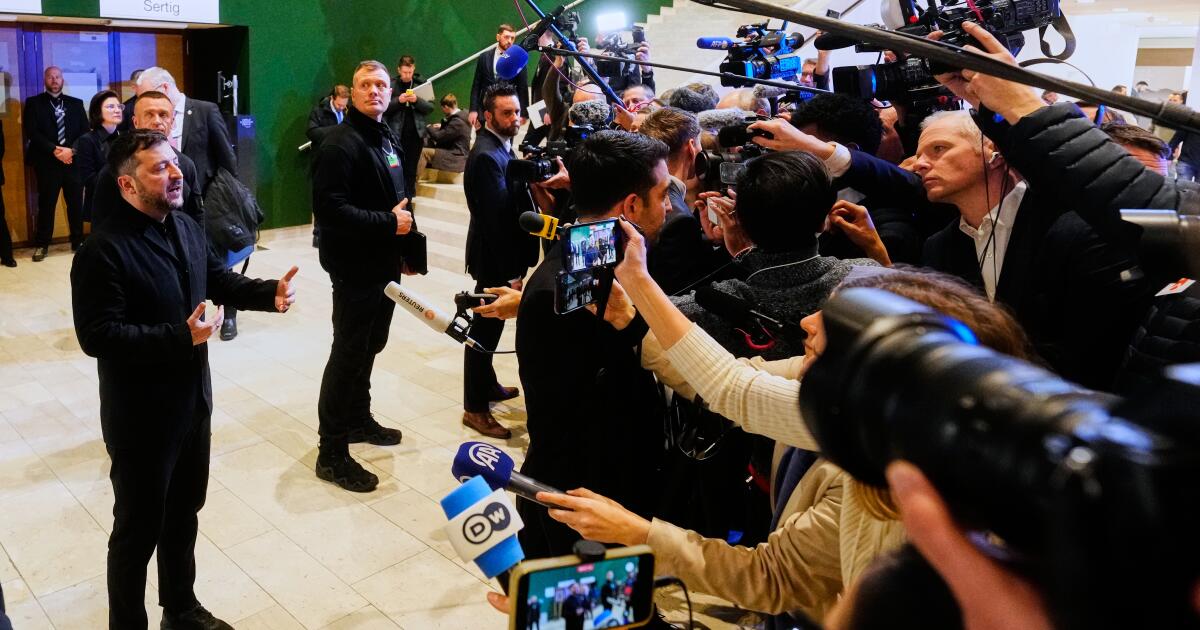Russia, Ukraine and the U.S. are holding peace talks in Abu Dhabi
Ukrainian, Russian and U.S. envoys met in the United Arab Emirates on Friday, the first known instance that officials from the Trump administration have sat down with both countries as part of Washington’s push for progress to end Moscow’s nearly 4-year-old invasion.
The talks follow a flurry of diplomatic activity in recent days, from Switzerland to the Kremlin, even though serious obstacles remain between both sides.
While Ukrainian President Volodymyr Zelensky said in Davos, Switzerland, on Thursday that a potential peace deal was “nearly ready,” certain sensitive sticking points — most notably those related to territorial issues — remain unresolved.
Here’s what’s known and not known about the meeting:
What’s different about these talks
They are taking place in the UAE’s capital of Abu Dhabi. Representatives from Russia and Ukraine have already met several times on separate occasions, but this is believed to be the first time U.S. envoys will be there too — a significant step in that President Trump has been pressing for a halt to the war.
The talks are an outgrowth of recent diplomatic activity, even though Russia has kept up its attacks on Ukraine and its energy infrastructure, leaving parts of the country without power amid a bitterly cold winter.
Zelensky met with Trump on Thursday behind closed doors for about an hour at the World Economic Forum in Davos, describing it as a “productive and meaningful” session. Trump said later that it had gone well and that Russia and Ukraine were “making concessions” to try to end the war.
Russian President Vladimir Putin met U.S. envoys Steve Witkoff and Trump’s son-in-law Jared Kushner in overnight talks at the Kremlin that lasted nearly four hours.
A spokesman for Zelensky said there are “many different formats in these talks — sometimes participants step aside for separate discussions, sometimes everyone meets together, sometimes several groups break off by topic.”
Who is participating
The U.S. has confirmed Witkoff and Kushner are attending. Army Secretary Dan Driscoll also is part of the team, according to a U.S. official who spoke on condition of anonymity to discuss a sensitive diplomatic process. NATO’s top general, U.S. Air Force Gen. Alexus Grynkewich, also is attending.
The Ukrainian team includes Rustem Umerov, head of Ukraine’s national security and defense council; Andrii Hnatov, chief of the general staff; and Kyrylo Budanov, head of the presidential office.
Putin’s foreign affairs advisor Yuri Ushakov said Russia’s delegation is led by the chief of military intelligence, Adm. Igor Kostyukov. The Kremlin later said the rest of the delegation are from the Defense Ministry as well, but did not elaborate. Putin’s envoy Kirill Dmitriev also is attending.
The talks are scheduled to conclude Saturday.
Questions of territory and security
Little is known about the specific issues to be discussed. Zelensky said the fraught issue of territorial concessions is a likely topic, while the Kremlin offered few details beyond calling the meeting a “working group on security issues.” Separate economic discussions will take place between Witkoff and Dmitriev, Kremlin officials said.
The sides have indicated that a possible peace deal hinges on the apparently still unresolved issue of territory. Speaking in a WhatsApp chat with journalists Friday, Zelensky described the issue of who would control the Donbas region of eastern Ukraine as “key.”
Russia’s bigger army has managed to capture about 20% of Ukraine since hostilities began in 2014 and its full-scale invasion of 2022. But the battlefield gains along the roughly 600-mile front line have been costly for Moscow, and the Russian economy is feeling the consequences of the war and international sanctions.
In his briefing on Putin’s meeting with Witkoff and Kushner, Ushakov stressed that “reaching a long-term settlement can’t be expected without solving the territorial issue,” a reference to Moscow’s demand that Kyiv withdraw its troops from areas in the east that Russia illegally annexed in 2022 but never fully captured.
Peskov also said Friday that Moscow had already made its position clear and that Kyiv must withdraw its troops from the Donbas region.
Ukraine has been pressing for security guarantees from the West to prevent Russia from invading its territory again.
Davies writes for the Associated Press. AP writer Kamila Hrabchuk in Kyiv, Ukraine, contributed to this report.
